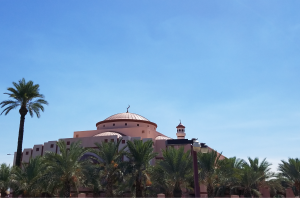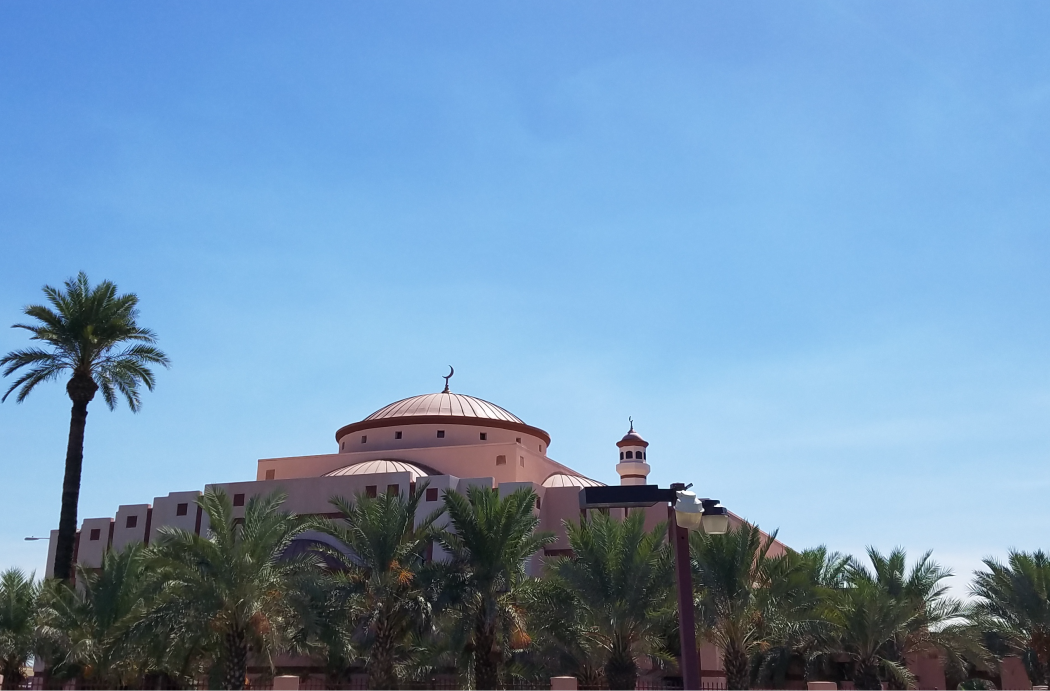My first clinical experience was at the Cultural Cup Food Bank, located less than 10 minutes from campus. The Cultural Cup is a primarily Muslim-run organization that provides many services to the Phoenix community as a whole. About once a week, they offer a free clinic where a physician can do basic screenings and check-ups on anyone who walks through the door. Not only was it a humbling experience getting to help take care of some of the most vulnerable people, it was a spiritually uplifting moment for myself. Speaking with one of the volunteer physicians, Dr. Khalife, reminded me about a particularly poignant verse in the Islamic holy book, the Qur’an: “And whoever saves a life—it is as if he/she had saved all of mankind” [5:32].
One of the five pillars of faith in Islam is charity, also known as Zakat. Giving to those less fortunate is pervasive within the Islamic tradition, to the point where even smiling to another individual is considered an act of charity. These ideas have been extended to the field of healthcare, where Muslim philosophers placed a heavy emphasis on healing. The Islamic “golden age” of the 11th and 12th centuries birthed thinkers such as Ibn Al-Nafis—who “described the pulmonary circulation more than 300 years before William Harvey” [1]. Ibn Sina (Avicenna), who was greatest known for creating a system of holistic medicine, where “physical and psychological factors, drugs, and diet were combined in treating patients,” was regarded as the “final authority on medical matters in Europe for several centuries.”

Islamic Community Center of Phoenix
I’ll stop myself short of making this a history lesson, and fast-forward to modern times. Where are these great Muslim thinkers and innovators in the medical field today?
Well, I could list the many tens of thousands American Muslim physicians, nurses, scientists, biomedical engineers, social workers, and teachers around the country. With a significant amount of Muslim healthcare workers reporting religious discrimination against them, it might do some good to provide that list. But, instead, I’ll tell you about my mom, who was the first healer in my world. Over ten years ago, while my mom was driving me to school, a child fell off his bike and injured himself pretty badly. Swiftly—almost as if it was etched into her DNA—my mom pulled over and delivered first aid to the kid, all the while comforting him with a smile on her face. My mother has been a constant role model for me as someone who takes the spiritual aspects of my religion and puts it into practice on a daily basis.
The Qur’an makes a point in many instances to highlight the beauty of the world around us, even regarding the intricacy of the human body as a miracle. Physical health—homeostasis—in our bodies can be profound, to those with or without religion. On the opposite end, sickness and disease can be equally profound. I am proud to say that my faith has taught me to appreciate our homeostasis, to respect our frailty, to push myself, and to do my small part in taking care of mankind.
- Majeed, A. How Islam changed medicine. https://www.ncbi.nlm.nih.gov/pmc/articles/PMC1322233/
- Padela, A., et al. Religious identity and workplace discrimination: A national survey of American Muslim physicians. http://www.tandfonline.com/doi/abs/10.1080/23294515.2015.1111271
Omar Hussain, an Arizona native, is a second-year student at UA COM-P. He graduated from The University of Arizona with a degree in neuroscience in 2015. Omar has interests in the medical humanities and rural medicine and wants to one day practice as a child neurologist. In his spare him, Omar enjoys playing video games and writing awkward bios about himself in the third person.

